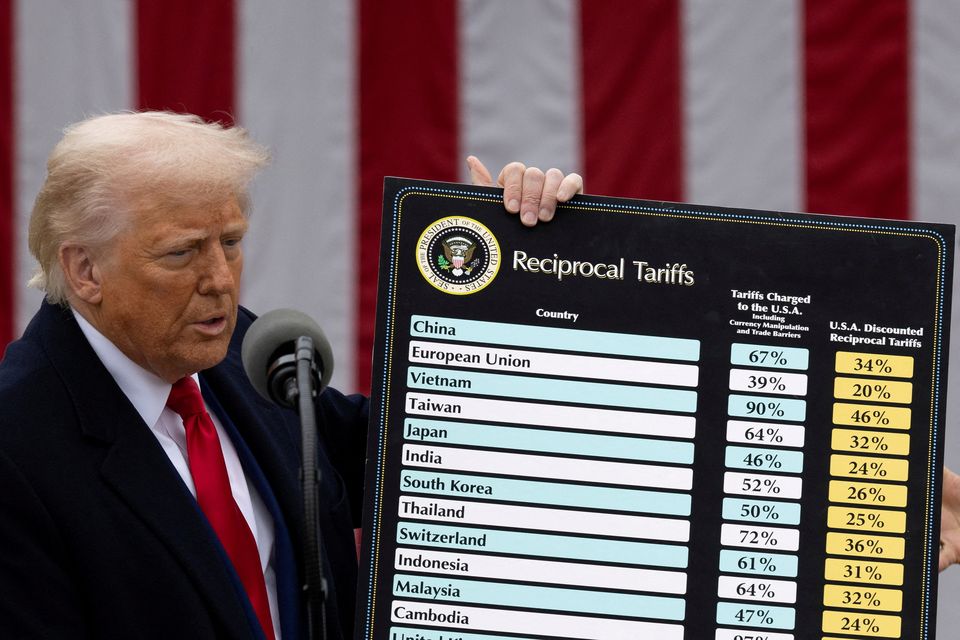Hurricane Trump appears to have made landfall. When the time comes to count the losses, the record will show that it didn’t just happen. Oversights and bungled responses to unforeseen events weren’t to blame.
The cause was deliberate acts of policy executed in proud, strutting defiance of prevailing expert opinion. Read more The White House and its enablers in Congress have no excuse for what’s coming. The president’s “Liberation Day” announcement on tariffs was much more aggressive and far-reaching than expected.

Financial markets were already in turmoil, but something closer to outright panic followed. Share prices tanked and US bond prices moved up sharply, an unambiguous signal of surging uncertainty and heightened risk of recession. As far as tariffs are concerned, there may be more bad news to come.
Unfortunately, the economic danger isn’t confined to trade disruption and its direct consequences. Within a few days, all three dangers had become vastly more ominous Trade is only one of three linked and converging factors. Recently, I explained its connection to two other threats: unsustainable escalating public debt and cracks in the Federal Reserve’s freedom to direct monetary policy.
Within a few days, all three dangers had become vastly more ominous – and in every case, overt policy choices are to blame. Donald Trump’s recent declaration adds to tariffs already planned or introduced (on steel, aluminium and cars), an across-the-board levy of 10pc on almost all imports, plus so-called reciprocal tariffs applied to 60 trade partners on a country-by-country basis. The EU faces a tariff of 20pc; Japan 24pc; Taiwan 32pc; China 34pc (54pc once you include a 20pc tariff announced earlier).
There’s also the threat of much more and much worse to come. US treasury secretary Scott Bessent says tariffs can be negotiated down. Photo: Bloomberg Some defenders of this insanity, including, notably, US treasury secretary Scott Bessent, say that the new barriers will be lower in due course.
They’re a “ceiling” and countries will be able to offer concessions and negotiate the tariffs down to some unspecified floor. Maybe. Vietnam, for instance, depends heavily on its exports to the US and faces a punitive tariff of 46pc.
It might have no choice but to submit. Trump says it’s offering to eliminate its tariffs on US goods. But not every country is Vietnam.
China has already announced commensurate tariffs on imports from the US and new controls on its exports of rare earths. Taking a sledgehammer to trade imposes a supply shock like the oil-price spikes of the 1970s The EU’s leaders are also discussing countermeasures. A cycle of retaliation and counter-retaliation could easily take hold.
This threatens recession – but not just any recession. Taking a sledgehammer to trade imposes a supply shock like the oil-price spikes of the 1970s. It pushes output down while pushing prices up – the condition (if it persists) is called stagflation, and is a central bank’s worst nightmare.
In such circumstances, monetary policy must choose between supporting output and suppressing inflation. It can’t do both. Donald Trump will object if the Federal Reserve chooses to prioritise price stability.
Photo: Reuters If the Federal Reserve chooses to prioritise price stability, Trump – who’s already calling for faster interest-rate cuts – will be furious and object. So the trade war tees up a fight for control of US monetary policy – in its own right, another grave threat to economic stability. Now add in the impending fiscal breakdown, a danger that trade has sidelined – for the moment.
The Congressional Budget Office recently published its annual assessment of the long-term outlook for deficits and public debt. On the so-called current-law basis, which assumes, among other things, that the most expensive provisions in the 2017 Tax Cuts and Jobs Act will expire next year as promised, the outlook is plainly unsustainable. Debt held by the public – the most relevant metric – stands at 100pc of GDP this year, rising to 118pc in 2035, 136pc in 2045 and 156pc in 2055.
Those numbers, as they stand, demand immediate action. Read more.
Politics

Clive Crook: Trade war and spiralling public debt are a recipe for ruin

Hurricane Trump appears to have made landfall.















